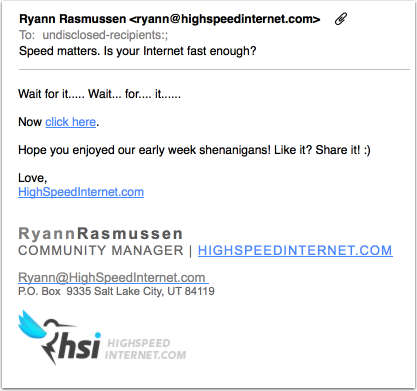You paid money for that?
- laura
- Uncategorized
- June 17, 2014
I just got a call from someone claiming that I “filled out an online form” asking for more information about “an online education.” When pressed, the nice woman kept changing her story about who she was calling for or how she got my phone number. Eventually she admitted that they have a collection of 50 or more websites and it’s very possible that I didn’t give them my information directly.
She did want to reassure me that I had “no obligation to respond.”
How very thoughtful of her to reassure me that some random person giving her my corporate phone number does not obligate me to anything.
I don’t believe for a second that anyone who knows me signed me up to receive information. But I do appear to have gotten on some new mailing list recently. I’m getting a lot of ‘internship’ and ‘summer work’ offers in snail mail. These advertisements that are clearly targeting a different demographic than the one I belong to.
At least 4 companies (so far) seem to have paid good money for totally fake information about me. Of course, when they’re calling or sending me mail there’s no way I can stop it or fix it. I can’t even tell them their vendor is giving them bad information. I guess I just have to take comfort in the fact that they are wasting their money. I only wish they weren’t wasting my time as well.
This is just one example of why purchasing information, or trusting information filled into websites, is a bad idea. The company selling my information makes their profit and it doesn’t matter that their information is bad. If it really was someone filling in my information, that person is wasting the company’s time.
I’ve worked with marketers long enough to know that they just consider the bad data a cost of doing business. Data integrity just isn’t relevant to making a profit. Send enough email, send enough postcards, ring enough phones and profit appears. Even if their targets aren’t what they were sold.
